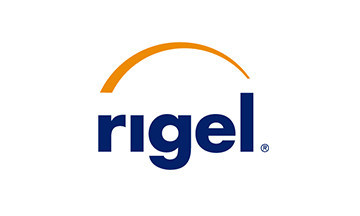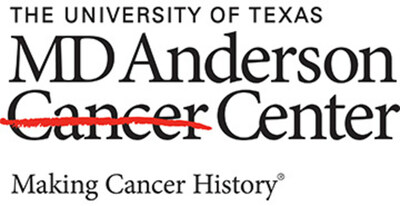Rigel Pharmaceuticals Aktie
WKN: 766093 / ISIN: US7665596034
|
08.12.2023 14:05:00
|
Rigel Pharmaceuticals and MD Anderson Announce Strategic Alliance to Advance REZLIDHIA® (Olutasidenib) in AML and Other Cancers
SOUTH SAN FRANCISCO, Calif. and HOUSTON, Dec. 8, 2023 /PRNewswire/ -- Rigel Pharmaceuticals, Inc. (Nasdaq: RIGL) and The University of Texas MD Anderson Cancer Center (MD Anderson) today announced a multi-year strategic development collaboration to expand the evaluation of REZLIDHIA® (olutasidenib) in acute myeloid leukemia (AML) and other hematologic cancers.
The alliance brings together MD Anderson's clinical research expertise with Rigel's differentiated targeted molecule. Under the strategic collaboration, Rigel and MD Anderson will evaluate the potential of olutasidenib to treat newly diagnosed and relapsed or refractory (R/R) patients with AML, higher-risk myelodysplastic syndromes (MDS), and advanced myeloproliferative neoplasms (MPN), in combination with other agents. The collaboration will also support the evaluation of olutasidenib as monotherapy in lower-risk MDS and as maintenance therapy in post-hematopoietic stem cell transplant patients.
"We are excited to enter into this strategic alliance with the exceptional team at MD Anderson to evaluate REZLIDHIA as a potential therapy for a broad range of IDH1-mutant cancers," said Raul Rodriguez, Rigel's president and CEO. "We believe REZLIDHIA has the potential to become a standard of care for patients in urgent need of new hematology-oncology therapies. We look forward to a close collaboration with MD Anderson to advance this as a new therapeutic option for more patients."
REZLIDHIA is a potent, selective, oral, small-molecule inhibitor of mutated IDH1 (mIDH1)1 designed to bind to and inhibit mIDH1 to reduce 2-hydroxyglutarate levels and restore normal cellular differentiation of myeloid cells. REZLIDHIA is approved by the Food and Drug Administration (FDA) for the treatment of adult patients with R/R AML with a susceptible isocitrate dehydrogenase-1 (IDH1) mutation as detected by an FDA-approved test.
"Based on its differentiated profile and compelling clinical data to date, REZLIDHIA has the potential, beyond its currently approved indication, to benefit patients with various cancers where mutant IDH1 is thought to play a role," said Courtney DiNardo, M.D., professor of Leukemia. "We look forward to collaborating with Rigel to conduct in-depth studies that will determine the broader potential of REZLIDHIA in these patient populations."
Rigel and MD Anderson will jointly lead all clinical development efforts, which will be overseen by a joint steering committee. Rigel will provide $15 million in time-based milestone payments and study material over the five-year collaboration. Rigel will retain all rights to its programs under the collaboration.
About AML
Acute myeloid leukemia (AML) is a rapidly progressing cancer of the blood and bone marrow that affects myeloid cells, which normally develop into various types of mature blood cells. AML occurs primarily in adults and accounts for about 1 percent of all adult cancers. The American Cancer Society estimates that in the United States alone, there will be about 20,380 new cases, most in adults, in 2023.2
Relapsed AML affects about half of all patients who, following treatment and remission, experience a return of leukemia cells in the bone marrow.3 Refractory AML, which affects between 10 and 40 percent of newly diagnosed patients, occurs when a patient fails to achieve remission even after intensive treatment.4 Quality of life declines for patients with each successive line of treatment for AML, and well-tolerated treatments in relapsed or refractory disease remain an unmet need.
About REZLIDHIA®
INDICATION
REZLIDHIA is indicated for the treatment of adult patients with relapsed or refractory acute myeloid leukemia (AML) with a susceptible isocitrate dehydrogenase-1 (IDH1) mutation as detected by an FDA-approved test.
IMPORTANT SAFETY INFORMATION
WARNING: DIFFERENTIATION SYNDROME |
Differentiation syndrome, which can be fatal, can occur with REZLIDHIA treatment. Symptoms may include dyspnea, pulmonary infiltrates/pleuropericardial effusion, kidney injury, hypotension, fever, and weight gain. If differentiation syndrome is suspected, withhold REZLIDHIA and initiate treatment with corticosteroids and hemodynamic monitoring until symptom resolution. |
WARNINGS AND PRECAUTIONS
Differentiation Syndrome
REZLIDHIA can cause differentiation syndrome. In the clinical trial of REZLIDHIA in patients with relapsed or refractory AML, differentiation syndrome occurred in 16% of patients, with grade 3 or 4 differentiation syndrome occurring in 8% of patients treated, and fatalities in 1% of patients. Differentiation syndrome is associated with rapid proliferation and differentiation of myeloid cells and may be life-threatening or fatal. Symptoms of differentiation syndrome in patients treated with REZLIDHIA included leukocytosis, dyspnea, pulmonary infiltrates/pleuropericardial effusion, kidney injury, fever, edema, pyrexia, and weight gain. Of the 25 patients who experienced differentiation syndrome, 19 (76%) recovered after treatment or after dose interruption of REZLIDHIA. Differentiation syndrome occurred as early as 1 day and up to 18 months after REZLIDHIA initiation and has been observed with or without concomitant leukocytosis.
If differentiation syndrome is suspected, temporarily withhold REZLIDHIA and initiate systemic corticosteroids (e.g., dexamethasone 10 mg IV every 12 hours) for a minimum of 3 days and until resolution of signs and symptoms. If concomitant leukocytosis is observed, initiate treatment with hydroxyurea, as clinically indicated. Taper corticosteroids and hydroxyurea after resolution of symptoms. Differentiation syndrome may recur with premature discontinuation of corticosteroids and/or hydroxyurea treatment. Institute supportive measures and hemodynamic monitoring until improvement; withhold dose of REZLIDHIA and consider dose reduction based on recurrence.
Hepatotoxicity
REZLIDHIA can cause hepatotoxicity, presenting as increased alanine aminotransferase (ALT), increased aspartate aminotransferase (AST), increased blood alkaline phosphatase, and/or elevated bilirubin. Of 153 patients with relapsed or refractory AML who received REZLIDHIA, hepatotoxicity occurred in 23% of patients; 13% experienced grade 3 or 4 hepatotoxicity. One patient treated with REZLIDHIA in combination with azacitidine in the clinical trial, a combination for which REZLIDHIA is not indicated, died from complications of drug-induced liver injury. The median time to onset of hepatotoxicity in patients with relapsed or refractory AML treated with REZLIDHIA was 1.2 months (range: 1 day to 17.5 months) after REZLIDHIA initiation, and the median time to resolution was 12 days (range: 1 day to 17 months). The most common hepatotoxicities were elevations of ALT, AST, blood alkaline phosphatase, and blood bilirubin.
Monitor patients frequently for clinical symptoms of hepatic dysfunction such as fatigue, anorexia, right upper abdominal discomfort, dark urine, or jaundice. Obtain baseline liver function tests prior to initiation of REZLIDHIA, at least once weekly for the first two months, once every other week for the third month, once in the fourth month, and once every other month for the duration of therapy. If hepatic dysfunction occurs, withhold, reduce, or permanently discontinue REZLIDHIA based on recurrence/severity.
ADVERSE REACTIONS
The most common (≥20%) adverse reactions, including laboratory abnormalities, were aspartate aminotransferase increased, alanine aminotransferase increased, potassium decreased, sodium decreased, alkaline phosphatase increased, nausea, creatinine increased, fatigue/malaise, arthralgia, constipation, lymphocytes increased, bilirubin increased, leukocytosis, uric acid increased, dyspnea, pyrexia, rash, lipase increased, mucositis, diarrhea and transaminitis.
DRUG INTERACTIONS
- Avoid concomitant use of REZLIDHIA with strong or moderate CYP3A inducers.
- Avoid concomitant use of REZLIDHIA with sensitive CYP3A substrates unless otherwise instructed in the substrates prescribing information. If concomitant use is unavoidable, monitor patients for loss of therapeutic effect of these drugs.
LACTATION
Advise women not to breastfeed during treatment with REZLIDHIA and for 2 weeks after the last dose.
GERIATRIC USE
No overall differences in effectiveness were observed between patients 65 years and older and younger patients. Compared to patients younger than 65 years of age, an increase in incidence of hepatotoxicity and hypertension was observed in patients ≥65 years of age.
HEPATIC IMPAIRMENT
In patients with mild or moderate hepatic impairment, closely monitor for increased probability of differentiation syndrome.
Click here for Full Prescribing Information, including Boxed WARNING.
To report side effects of prescription drugs to the FDA, visit www.fda.gov/medwatch or call 1-800-FDA-1088 (800-332-1088).
REZLIDHIA is a registered trademark of Rigel Pharmaceuticals, Inc.
About Rigel
Rigel Pharmaceuticals, Inc. (Nasdaq: RIGL) is a biotechnology company dedicated to discovering, developing and providing novel therapies that significantly improve the lives of patients with hematologic disorders and cancer. Founded in 1996, Rigel is based in South San Francisco, California. For more information on Rigel, the Company's marketed products and pipeline of potential products, visit www.rigel.com.
About MD Anderson
The University of Texas MD Anderson Cancer Center in Houston ranks as one of the world's most respected centers focused on cancer patient care, research, education and prevention. The institution's sole mission is to end cancer for patients and their families around the world, and, in 1971, it became one of the nation's first National Cancer Institute (NCI)-designated comprehensive cancer centers. MD Anderson is No. 1 for cancer in U.S. News & World Report's "Best Hospitals" rankings and has been named one of the nation's top two hospitals for cancer since the rankings began in 1990. MD Anderson receives a cancer center support grant from the NCI of the National Institutes of Health (P30 CA016672).
doi: https://doi.org/10.1182/bloodadvances.2022009411
Forward Looking Statements
This press release contains forward-looking statements relating to, among other things, the potential and market opportunity of REZLIDHIA (olutasidenib), both as a monotherapy and in combination with other agents, as a therapeutic for R/R AML and other conditions, the potential of REZLIDHIA as a therapy for a broad range of mIDH1 cancers, the potential of REZLIDHIA to become a standard of care for patients in need of new hematology-oncology therapies and the benefits of Rigel's collaboration with MD Anderson Cancer Center. Any statements contained in this press release that are not statements of historical fact may be deemed to be forward-looking statements. Forward-looking statements can be identified by words such as "potential", "may", "will" and similar expressions in reference to future periods. Forward-looking statements are neither historical facts nor assurances of future performance. Instead, they are based on Rigel's current beliefs, expectations, and assumptions and hence they inherently involve significant risks and uncertainties and are subject to changes in circumstances that are difficult to predict and many of which are outside of our control. Therefore, you should not rely on any of these forward-looking statements. Actual results and the timing of events could differ materially from those anticipated in such forward looking statements as a result of these risks and uncertainties, which include, without limitation, the risks and uncertainties of clinical trials and drug development; risks and uncertainties of commercialization and marketing of olutasidenib; risks that the FDA, European Medicines Agency, PMDA or other regulatory authorities may make adverse decisions regarding olutasidenib; risks that clinical trials may not be predictive of real-world results or of results in subsequent clinical trials; risks that olutasidenib may have unintended side effects, adverse reactions or incidents of misuse; the availability of resources to develop Rigel's product candidates; market competition; as well as other risks detailed from time to time in Rigel's reports filed with the Securities and Exchange Commission, including its Quarterly Report on Form 10-Q for the quarter ended September 30, 2023 and subsequent filings. Any forward-looking statement made by us in this press release is based only on information currently available to us and speaks only as of the date on which it is made. Rigel does not undertake any obligation to update forward-looking statements, whether written or oral, that may be made from time to time, whether as a result of new information, future developments or otherwise, and expressly disclaims any obligation or undertaking to release publicly any updates or revisions to any forward-looking statements contained herein, except as required by law.
Rigel Investor & Media Contacts:
Investors:
Rigel Pharmaceuticals, Inc.
650.624.1232
ir@rigel.com
Media:
David Rosen
Argot Partners
Phone: 212.600.1902
Email: david.rosen@argotpartners.com
MD Anderson Media Contact:
Clayton Boldt, Ph.D.
Public Relations
Phone: 713.792.9518
Email: CRBoldt@MDAnderson.org
![]() View original content to download multimedia:https://www.prnewswire.com/news-releases/rigel-pharmaceuticals-and-md-anderson-announce-strategic-alliance-to-advance-rezlidhia-olutasidenib-in-aml-and-other-cancers-302009825.html
View original content to download multimedia:https://www.prnewswire.com/news-releases/rigel-pharmaceuticals-and-md-anderson-announce-strategic-alliance-to-advance-rezlidhia-olutasidenib-in-aml-and-other-cancers-302009825.html
SOURCE Rigel Pharmaceuticals, Inc.
 Der finanzen.at Ratgeber für Aktien!
Der finanzen.at Ratgeber für Aktien!
Wenn Sie mehr über das Thema Aktien erfahren wollen, finden Sie in unserem Ratgeber viele interessante Artikel dazu!
Jetzt informieren!
Nachrichten zu Rigel Pharmaceuticals IncShsmehr Nachrichten
| Keine Nachrichten verfügbar. |

